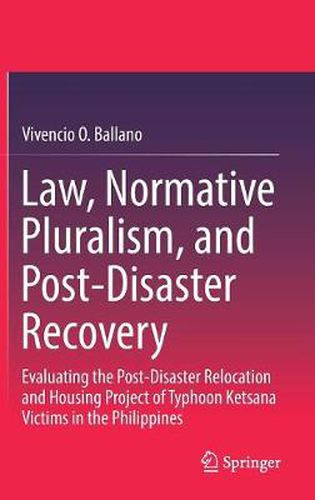Readings Newsletter
Become a Readings Member to make your shopping experience even easier.
Sign in or sign up for free!
You’re not far away from qualifying for FREE standard shipping within Australia
You’ve qualified for FREE standard shipping within Australia
The cart is loading…






This title is printed to order. This book may have been self-published. If so, we cannot guarantee the quality of the content. In the main most books will have gone through the editing process however some may not. We therefore suggest that you be aware of this before ordering this book. If in doubt check either the author or publisher’s details as we are unable to accept any returns unless they are faulty. Please contact us if you have any questions.
This book looks at how the multiplicity of formal and informal normative systems that actualize the post-disaster recovery goals of the country’s Disaster Risk Reduction and Management Act of 2010 has resulted in the inadequate housing and relocation of Typhoon Ketsana victims in the Philippines. Using the sociological and normative pluralist perspectives and the case study method, it evaluates the level of conformity of the components of the housing project according to international conventions and legal standards. It highlights the negative unintended consequences caused by the complex normative regimes of various competing stakeholders, rigid real estate regulation, and the unscrupulous involvement of powerful and ‘corrupt’ real estate developers and housing groups as largely contributing to the project’s deviation from the law’s proactive objectives. This book attempts to promote the socio-legal perspectives which have long been overlooked in disaster research. Finally, it invites policymakers to enact a comprehensive disaster law and create a one-stop disaster management agency to improve the long-term rehabilitation of disaster victims in developing countries such as the Philippines.
$9.00 standard shipping within Australia
FREE standard shipping within Australia for orders over $100.00
Express & International shipping calculated at checkout
This title is printed to order. This book may have been self-published. If so, we cannot guarantee the quality of the content. In the main most books will have gone through the editing process however some may not. We therefore suggest that you be aware of this before ordering this book. If in doubt check either the author or publisher’s details as we are unable to accept any returns unless they are faulty. Please contact us if you have any questions.
This book looks at how the multiplicity of formal and informal normative systems that actualize the post-disaster recovery goals of the country’s Disaster Risk Reduction and Management Act of 2010 has resulted in the inadequate housing and relocation of Typhoon Ketsana victims in the Philippines. Using the sociological and normative pluralist perspectives and the case study method, it evaluates the level of conformity of the components of the housing project according to international conventions and legal standards. It highlights the negative unintended consequences caused by the complex normative regimes of various competing stakeholders, rigid real estate regulation, and the unscrupulous involvement of powerful and ‘corrupt’ real estate developers and housing groups as largely contributing to the project’s deviation from the law’s proactive objectives. This book attempts to promote the socio-legal perspectives which have long been overlooked in disaster research. Finally, it invites policymakers to enact a comprehensive disaster law and create a one-stop disaster management agency to improve the long-term rehabilitation of disaster victims in developing countries such as the Philippines.